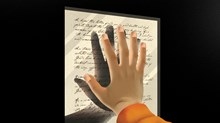First Things' managing editor interviewed Tim Keller on the occasion of his new book, The Reason for God: Belief in an Age of Skepticism, which Keller calls "Mere Christianity for Dummies." The table of contents is a list of common doubts about what orthodox Christians believe, which Keller answers in short, accessible arguments.
Keller says his motive in starting to write it was to lay out the big ideas behind what he had been preaching as a resource for members of his church, Redeemer Presbyterian. "And I think probably the other thing was this thing called aging," he told Anthony Sacramone.
While the interview loops back to the significance of denomination and affiliation, it also covers a broad range of topics. Some of the ground they covered:
On how this is different from the world Mere Christianity was broadcast in:
Lewis definitely lived at a time in which people were more certain across the board that empirical, straight-line rationality was the way you decided what truth was, and there's just not as much of a certainty now. Also, when Lewis was writing, people were able to follow sustained arguments that had a number of points that built on one another. I guess I should say we actually have a kind of rationality-attention-deficit disorder now. You can make a reasonable argument, you can use logic, but it really has to be relatively transparent. You have to get to your point pretty quickly.
I don't think they're irrational, they are as rational, but they want something of a mixture of logic and personal appeal.
On why believers should doubt:
Sacramone: You say early on in The Reason for God that a little doubt is necessary to test the integrity of your faith. Does this mean that Christians need to become amateur apologists to some extent, to be ready to give an answer for the hope that is within them?
Keller: I don't mention it in [The Reason for God], but I think there are always doubts that, if you come to grips with them - I think there's doubts that you have, that you always have, that you ought to be more forthright and address them, for two reasons. One is, then you're a better apologist. Because now people are coming shootin' stuff at you in a way they wouldn't when I was growing up.
As I was reading [N. T. Wright's The Resurrection of the Son of God], I realized I was coming to greater certainty, and that when I closed the book, I said, at a time when it was very important to me to feel this way, I said, "He really really really did rise from the dead." And I said, "Well, didn't I believe that before?" Of course I believed it before - I defended it, and I think before I certainly would have died for that belief. But actually, there were still doubts in there, and the doubts were taken down 50 percent or something. I didn't even know they were there. And it was a wonderful experience It was both an intellectual and emotional experience: You're facing death, you're not sure you're going to get over the cancer. And the rigorous intellectual process of going through all the alternative explanations for how the Christian Church started, except the resurrection - none of them are even tenable. It was quite an experience.
On dealing with creation and evolution:
How could there have been death before Adam and Eve fell? The answer is, I don't know. But all I know is, didn't animals eat bugs? Didn't bugs eat plants? There must have been death. In other words, when you realize, "Oh wait, this is really complicated," then you realize, "I don't have to figure this out before I figure out is Jesus Christ raised from the dead."
Tim Keller is taking the book tour to Veritas forums at various colleges throughout the U.S.

Support Our Work
Subscribe to CT for less than $4.25/month

















